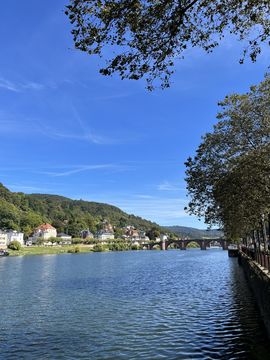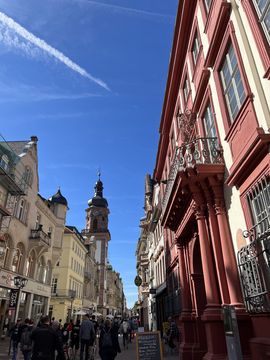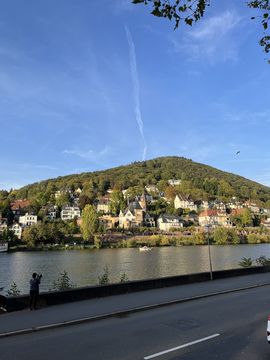Are you having trouble finding an internship in Germany? Let me tell you my story and try to help you!
The adventure of finding an internship
My journey to find an internship in Germany was… an adventure. For my master’s, after two semesters of classes, we need to do a mandatory internship, and it could be anywhere in the world, as long as it was related to culture and media.
I was very positive and hopeful about finding an internship in Germany. It would have been easier to do it in Portugal; I could’ve done it in some other country, maybe an English-speaking country, but I decided that I wanted to do it in Germany because that’s where I want to stay, and I thought it would help me learn German. What I did not know was that it is very difficult to find an English-speaking internship. Also, a paying internship, especially in the culture field.
So, I started looking on job-finding websites, and I couldn’t find anything related to art and culture—nothing!! I searched for almost 5 months and have found nothing. So, I decided to start writing to museums, art magazines, culture organizations, and anything related to art and culture.
I have received “We are not looking for any interns at the moment” or “You would need to speak German to do this internship,“ and I was starting to lose hope.
A light at the end of the tunnel
Until I received an email from a Kunstverein in Heidelberg asking for my information and to schedule an interview. By this time, it was summer vacation, and I was back at home in Portugal, and the interview was in person. I thought I had lost this opportunity, but when I came back to Germany, I was able to do the interview, and they accepted me as an intern!
I was thrilled and nervous. I have never worked internationally or even at an art institution this important. I started to doubt my skills. I started to think that they would fire me on the second week because they would see that I was not at their level of work, and the imposter syndrome started to kick in.
In addition, I had to travel four hours a day from Darmstadt to Heidelberg, with two hours to go and two hours to come back. I did not want to move out of my house, and I did not want to lose this opportunity, so I tried.
How it goes
My first day came; it was a Monday. I was nervous-sweating for my two-hour ride. I decided to enter from the front door, but it wasn’t opening. I remember that on Mondays the Kunstverein is closed to the public, so I needed to enter from the back door, which made me arrive 5 minutes later than scheduled—a big thing for German people. Another thing: I thought the way of working would be very „Germanized,“ very strict, and very formal.
When I got there, the entire team of the institution was there, a total of four people. We started right away, looking at the calendar of the exhibitions and events, and I got work on my first day, something that I was not used to. All my nervousness passed when I saw that the environment was formal, yes, but also casual. I did not feel pressure; I felt like they were really there to teach me and that I was there to learn, not to get some coffee for them.
And this feeling continued until the end of my internship. I always felt welcomed, and I always felt secure. I learned so much about art, media, museums in Germany, and working as a team. It was only a 3-month and a half internship, but I have a huge bag of lessons that I will carry for my future career. Furthermore, I have indeed learned a bit more German.
Overall, it was a great experience, and traveling for 4 hours a day was worth it! Besides working with such great people in an institution like this, I got to see the beautiful city of Heidelberg, the river, the bridge, and the castle, roaming around the streets and finding very cute cafés and stores. Is something that I will keep forever in my mind.
Tips!
So, if you feel like you can’t find an internship, these are my tips for you:
- Don’t lose hope! If it’s meant for you to work somewhere, the time will come!
- But you should not sit around and just look on the usual platforms; send emails directly to the organizations or companies asking if there is an opening.
- Be prepared to not get paid. I say that I gained experience instead, and it’s all a process, but if you need something that pays, look deeper.
- If you don’t know German, try to highlight your other skills. Although knowing German would be great, I could work well without it.
Enjoy every moment as an intern, try to learn as much as you can, and create connections with people in your field!
Good luck!



Is there a chance for overseas students to be accepted, even if they don't have good German language skills, and good English?
Hi, To be completely honest: without any knowledge of German or English it could be rather difficult. You‘ll get along well with English in Germany, especially in the larger cities. Still it might be helpful to learn at least a little German. It will make your stay in Germany easier and you will be able to know the culture better. For most German degree programmes, knowledge of German (usually B2 level) is a prerequisite for admission. Please inform yourself at your future higher education institution whether you need a language certificate and if so, which one. Check the specific requirements on the website of the programmes you are interested in or get in touch with the International Office of the university. Find more information on language requirements our website 👉 www.study-in-germany.de/german-skills. There are also a variety of degree programmes that are offered in English. Especially for Master's programmes. To find out whether your desired course is taught in English, search the My GUIDE database 👉https://www.myguide.de/en/. You will hopefully find what you are looking for. If you have any further questions, you can contact us by email using our contact form 👉 https://www.study-in-germany.de/en/get-in-touch/contact/. Best wishes, Your Study in Germany-Team 👋🇩🇪
I graduated recently with distinction doing masters degree program in Data Science Management Universidad International de Valencia (VIU), Spain. I will like to do internship in Germany that will prepare me me further practical skills and knowledge that will make me more relevant for the PhD in ML or AI related field which I desire to do my PhD in Germany. Kindly help me out as I look forward to hearing from you. Thank you.
Hi, Are you interested in doing a doctorate/doing research in Germany? We have put together several helpful links for you. To get started, please find more information on the following website 👉 www.research-in-germany.org/en.html. For general information about doing a doctorate in Germany, funding opportunities and more, please have a look at the PhD section on 👉 http://www.research-in-germany.org/en. Please find comprehensive information about doing a doctorate/Ph.D. in Germany on our homepage at 👉 http://www.daad.de/deutschland/promotion/en/. You can visit the following homepage to search for subject areas offered at German institutions of higher education 👉 http://hochschulkompass.de/en/study-in-germany.html (German, English). Please contact the institutions of your choice directly for further details. Germany has a wide range of funding options available for international PhD students in several research fields. On the Research in Germany website you’ll find a selection of funding programmes offered by various funding organisations for international graduates and PhD students 👉 http://www.research-in-germany.org/en. If you have any further questions, you can contact us by email using our contact form 👉 https://www.study-in-germany.de/en/get-in-touch/contact/. Best wishes, Your Study in Germany-Team 👋🇩🇪